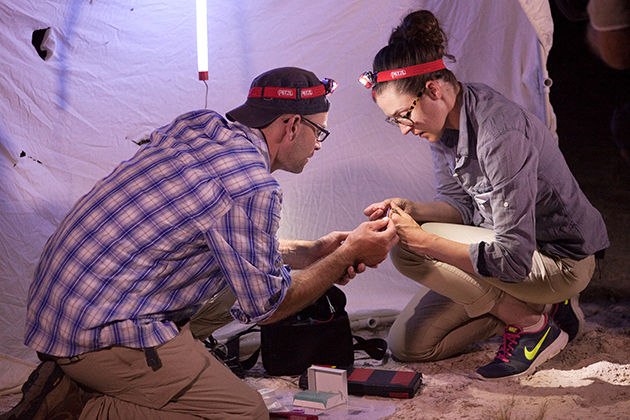This article was first published in the Spring 2014 print edition of UConn Magazine. To access more stories like this, visit s.uconn.edu/spring 14 or download UConn Magazine’s free app for tablet devices.

In a cover story titled “A World Without Bees,” Time magazine this past year addressed the troubling disappearance of honeybees – leading to questions of what it may mean to humankind should bees, bats, moths, and other pollinating animals worldwide continue to face such threats as loss of habitat and pesticide usage.
What exactly do we know about the planet’s pollinators? As botanist Krissa Skogen ’08 Ph.D. is quick to point out, “for most, we know next to nothing.”
An alumna of UConn’s ecology and evolutionary biology doctoral program and a conservation scientist at the Chicago Botanic Garden, Skogen has dedicated her research to exploring the vital relationships between numerous forms of plant life and the pollinators on which they depend for survival.
Her research has taken her from the prairies of rural Colorado to the dusky dunes of New Mexico’s White Sands National Monument, and has recently received support from the National Science Foundation’s Dimensions of Biodiversity Program. This past year, Skogen was also featured on the YouTube web series “Plants Are Cool, Too!” – an educational botany series created and hosted by fellow UConn alumnus Christopher Martine ’06 Ph.D.
Through her work, Skogen is beginning to gather answers to a variety of questions, including what role pollinators play in the life cycle of certain plant species. In one research project, she is studying evening primroses and sundrops, many of which are night-blooming wildflowers, and their chief pollinators, hawkmoths, which may travel up to an astonishing 20 miles each night on their quest to collect nectar from these fragrant blossoms.
“Projects like this help create a baseline knowledge about pollinators – bees, hawkmoths, bats – and help move the field forward and contribute to a greater understanding about plants and the insects that rely on them,” says Skogen, who also serves as an adjunct biology professor at Northwestern University. “Only through studies like this can we understand how that works, and be able to make predictions about the consequences of loss of plants or loss of pollinators.”
Watch Krissa Skogen ’08 Ph.D. at work at s.uconn.edu/desertblooms on the latest episode of YouTube web series “Plants Are Cool, Too!,” an adventure botany series created and hosted by her fellow UConn ecology and evolutionary biology alum Christopher Martine ’06 Ph.D. To read more about Skogen and Martine, visit s.uconn.edu/plants.


